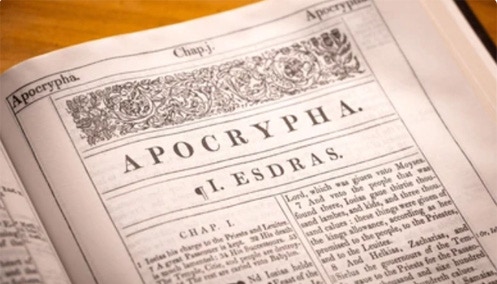


Common Objections
Common Objections
Catholic Outlook
Catholic Outlook

Catholic Outlook
Common Objections
Common Objections
__________ Recent Additions __________
Catholic Outlook
Catholic Outlook
__________ The “Apocrypha” __________
“These books lack the distinctive elements which give genuine Scripture their divine character, such as prophetic power and poetic and religious feeling.”
Gary Hoge

One thing I’ve noticed about genuine Scripture is that it really doesn’t have any “distinctive elements” that give it an obviously divine character. On the contrary, the canonical books display an amazing range of style and content. Some parts are beautifully written and deeply moving, but others are about as exciting to read as a census report. Some parts are a census report.
About the only thing these books have in common is the fact that they’re inspired. But, unfortunately, inspiration is an invisible quality, and there really are no objective literary characteristics that make inspiration obvious. Therefore, it’s pointless to arbitrarily establish “poetic and religious feeling” as the litmus test of inspiration because 1) it’s extremely subjective; 2) there’s no indication anywhere in Scripture that these are characteristics all inspired books must display; and 3) many of the books Protestants accept as inspired also don’t have much in the way of “poetic and religious feeling.”
Consider the book of Esther, for example. It’s a great story, but it never mentions God at all, not even once. It’s hard to see, then, how it could stir up a lot of “religious feeling.” Other than the fact that it’s in the Bible, there’s nothing overtly religious about it. And what about the dark nihilism of Ecclesiastes? What sort of warm religious feelings are we supposed to get when we read, “‘Meaningless! Meaningless!’ says the Teacher. ‘Utterly meaningless! Everything is meaningless’” (Ecclesiastes 1:2)? And how are our passions stirred toward the contemplation of our eternal destiny in Christ when we read, “Man’s fate is like that of the animals; the same fate awaits them both: As one dies, so dies the other. All have the same breath; man has no advantage over the animal. Everything is meaningless” (Ecclesiastes 3:19). Sorry, but that is one book that definitely fails the “religious feelings” test. In fact, if it weren’t already in the Bible, I doubt if it would ever occur to me to put it there.
Read the first eight chapters of 1 Chronicles sometime (I dare you!), then tell me how poetic those eye-glazing genealogies were. Or read Leviticus 13:47-14:57, which tells you more than you ever wanted to know about how to handle mildew, and tell me how your heart was strangely warmed by it.
Please don’t misunderstand me: I’m not mocking the Word of God. I’m simply pointing out that it’s wrong to equate being inspiring with being inspired. Just because a passage doesn't stir the emotions, that doesn't mean it's not genuine Scripture, and it’s not disrespectful to admit that some parts of the Bible are quite dull. The deuterocanonical books are much like the rest of the Old Testament in this respect. Some parts are exciting and moving, others are less so.
Moving on to something a bit more substantive, the author of this objection also feels that the deuterocanonical books must not be “genuine Scripture” because they lack “prophetic power.” But, it should be obvious that the absence of prophecy does not indicate that a book is not inspired, because many of the biblical books contain no prophecy at all. In fact, most of them don’t. What “prophetic power” does 3 John have? Or Paul’s private letter to Philemon?
Although the absence of prophecy doesn’t prove anything, I do think that the presence of genuine prophecy is a strong indication that a book is inspired, for where else can prophecy come from, except from God? For example, consider Isaiah 53, or Psalm 22, where it says:
7 All who see me mock me; they hurl insults, shaking their heads:
8 He trusts in the LORD; let the LORD rescue him. Let him deliver him, since he delights in him.
9 Yet you brought me out of the womb; you made me trust in you even at my mother’s breast.
10 From birth I was cast upon you; from my mothers womb you have been my God.
11 Do not be far from me, for trouble is near and there is no one to help.
12 Many bulls surround me; strong bulls of Bashan encircle me.
13 Roaring lions tearing their prey open their mouths wide against me.
14 I am poured out like water, and all my bones are out of joint. My heart has turned to wax; it has melted away within me.
15 My strength is dried up like a potsherd, and my tongue sticks to the roof of my mouth; you lay me in the dust of death.
16 Dogs have surrounded me; a band of evil men has encircled me, they have pierced my hands and my feet.
17 I can count all my bones; people stare and gloat over me.
18 They divide my garments among them and cast lots for my clothing.
Isn’t it obvious that that’s a description of the crucifixion of Jesus Christ? Yet, that psalm was written centuries before Jesus was born, which means that its uncanny similarity to the crucifixion of Jesus is either the most amazing coincidence in the history of the world, or a genuine example of divinely inspired prophetic writing.
So how do the deuterocanonical books stack up, prophecy-wise? Well, pretty much like the rest of the Bible, actually. They don’t contain much prophecy, but they do contain some. Consider this passage from the second chapter of the book of Wisdom:
12 Let us lie in wait for the righteous man, because he is inconvenient to us and opposes our actions; he reproaches us for sins against the law, and accuses us of sins against our training.
13 He professes to have knowledge of God, and calls himself a child of the Lord.
14 He became to us a reproof of our thoughts;
15 the very sight of him is a burden to us, because his manner of life is unlike that of others, and his ways are strange.
16 We are considered by him as something base, and he avoids our ways as unclean; he calls the last end of the righteous happy, and boasts that God is his father.
17 Let us see if his words are true, and let us test what will happen at the end of his life;
18 for if the righteous man is God’s child, he will help him, and will deliver him from the hand of his adversaries.
19 Let us test him with insult and torture, so that we may find out how gentle he is, and make trial of his forbearance.
20 Let us condemn him to a shameful death, for, according to what he says, he will be protected.
This passage was written at least a hundred and fifty years before Jesus was born, which means, once again, that its uncanny similarity to the life of Jesus is either an amazing coincidence, or something that looks remarkably like divine inspiration. It seems clear to me that it is a prophetic foretelling of the reaction of sinful men to the coming of Jesus, the “righteous man” (Luke 23:47) who “calls himself a child of the Lord,” and who says that “God is his father” (John 5:18). They reject him because he reproaches them for their sins (John 7:7). The people conspire to kill him (Matt. 12:14, Mark 3:6, 11:18), and verses 17-20 are eerily reminiscent of the taunts of the crowd at the foot of the cross: “He trusts in God. Let God rescue him now if he wants him, for he said, ‘I am the Son of God’” (Matt. 27:44).
One of my Protestant friends, when he read this passage, wrote to me saying, “It’s got to be one of the most clear-cut, obviously prophetic writings known to man, and it would have to be about the most detailed and explicit prophecy showing Jesus is the Messiah.” I agree. I think it’s right up there with Isaiah 53 and Psalm 22. Perhaps it’s one of the passages Paul used to convince his Jewish audience that “the Christ had to suffer and rise from the dead” (Acts 17:2-3).
There are many things that convinced my mind that the deuterocanonical books belong in the Bible, but this passage, more than any other, is what convinced my heart. Since the book of Wisdom was written so long before the events it so eerily foretells, can there be any doubt that it was inspired by God?
Copyright © 2024 Catholicoutlook.me
MENU